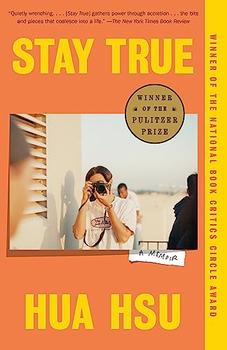Book Club Discussion Questions
In a book club? Subscribe to our Book Club Newsletter!
For supplemental discussion material see our Beyond the Book article, Zines and the 1990s and our BookBrowse Review of Stay True.
Please be aware that this discussion guide will contain spoilers!
- Discuss the narrator's relationship with his parents, who are at times far away. How would you describe the Hsu family dynamic?
- The memoir is set mainly in suburban California during the 1980s and 1990s. How does the time period and location shape Hua's experience of growing up? How does it mirror or contrast with your understanding of those decades?
- Music is a prominent element in Hua's life throughout the book, influencing both how he sees himself and how he judges others. How does the music he listens to relate to or reflect the events in his life, from childhood to college years? How does he change or incorporate other ways of engaging with society over the course of the narrative?
- The creation of original zines is Hua's ongoing focus during his college years. How does his creative process evolve across the narrative, and what does the zine represent at each stage of his life?
- The book explores class and generational differences in identifying with the Asian American label. Hua suspects that Ken's sense of confidence comes from the fact that his Japanese American family is more assimilated than Hua's Taiwanese American one is. Did this impact the way you think about cultural differences and Asian communities in America? If so, how?
- Compare and contrast Hua and Ken's tastes in pop culture, their approaches to life, and their ultimate fate in the book. What do you make of this unlikely friendship? How does their relationship deepen over time, and how did they end up influencing each other's lives?
- Hua explores his friendships and relationships via the lens of Marcel Mauss's social theory of reciprocity and gift exchange, in which a practice of gift giving is proposed as an alternative to the economic individual and capitalism. What benefits, if any, does a system of reciprocity provide to individuals and communities? What "lost world" (page 105) might be salvaged through a spirit of gift giving?
- Stay True is driven by the author's desire to remember his friend and reconcile with a senseless loss. Discuss how Hua's attitude toward Ken's death changes over time, and what his final reflections on the person he has become suggest about Hua's connection to grief, nostalgia, and living.
- How would you describe the support Hua receives from his friends, peers, parents, and counselors? How effective were they in helping him make sense of a tragedy?
- Have you ever experienced a sudden, shocking loss yourself or through someone you know? To which events in the memoir were you most able to relate? How would you choose to remember loved ones who have departed?
- As a teenager, Hua is preoccupied with projecting an image of "cool" and crafting a voice and a place for himself in the world. He broods on the idea of authenticity and the promise to "stay true." What does it mean for Hua to "stay true," and why did he choose this as the title for his memoir? What is authenticity to you?
Suggested Reading
Swing Time by Zadie Smith
So Many Olympic Exertions by Anelise Chen
Illegally Yours: A Memoir by Rafael Agustin
On Earth We're Briefly Gorgeous by Ocean Vuong
Minor Feelings: An Asian American Reckoning by Cathy Park Hong
Playlist
Reading
Stay True is like putting on a giant 90s mixtape and going back to college. There are far too many songs to include all in one place, but Hua has curated a select few into the playlist "Expressway to Yr Finals Week [1995-1998]" for your listening enjoyment. Press play, crack the spine, and find yourself immersed in 90s nostalgia.
Expressway to Yr Finals Week Playlist
Unless otherwise stated, this discussion guide is reprinted with the permission of Anchor Books.
Any page references refer to a USA edition of the book, usually the trade paperback version, and may vary in other editions.
